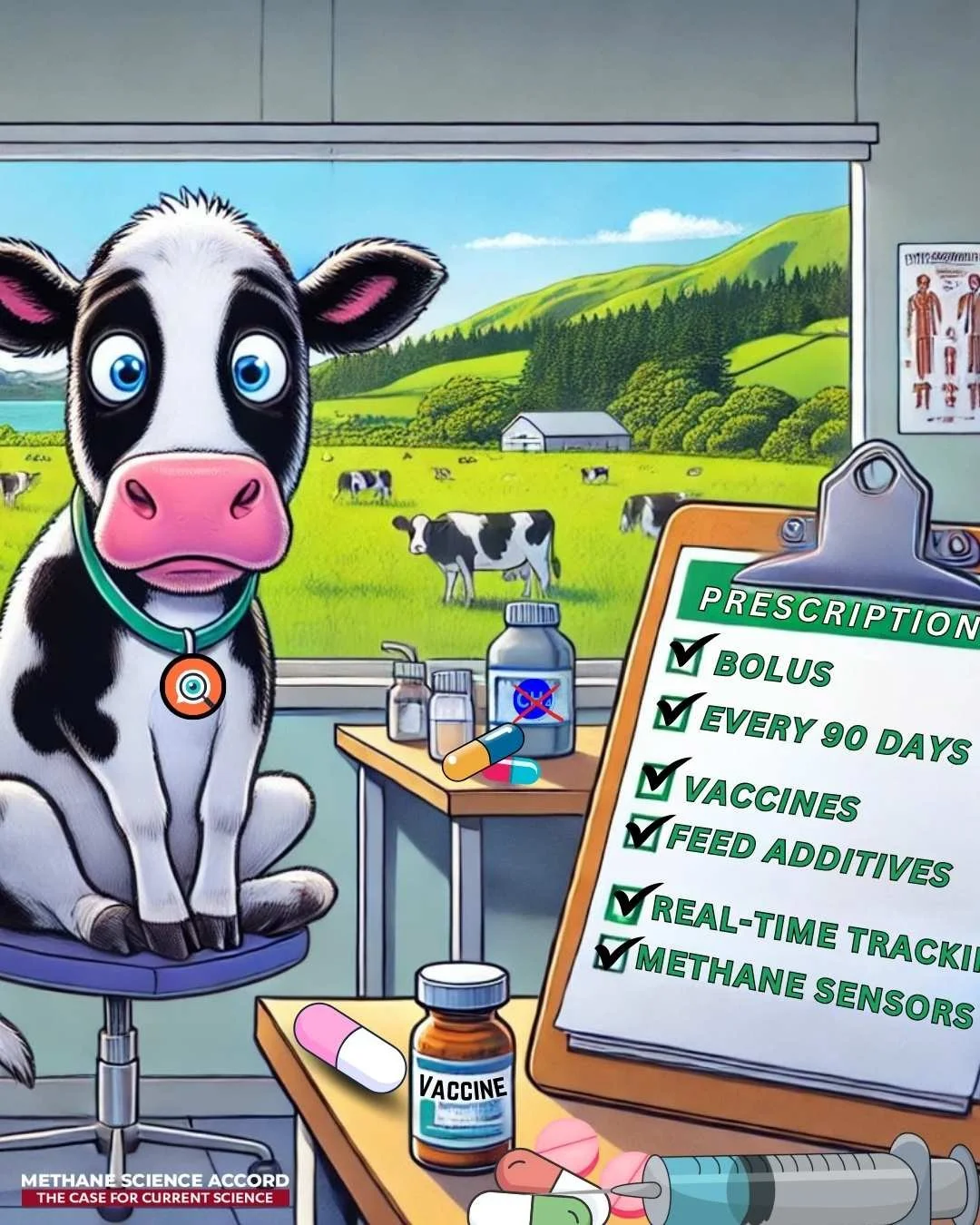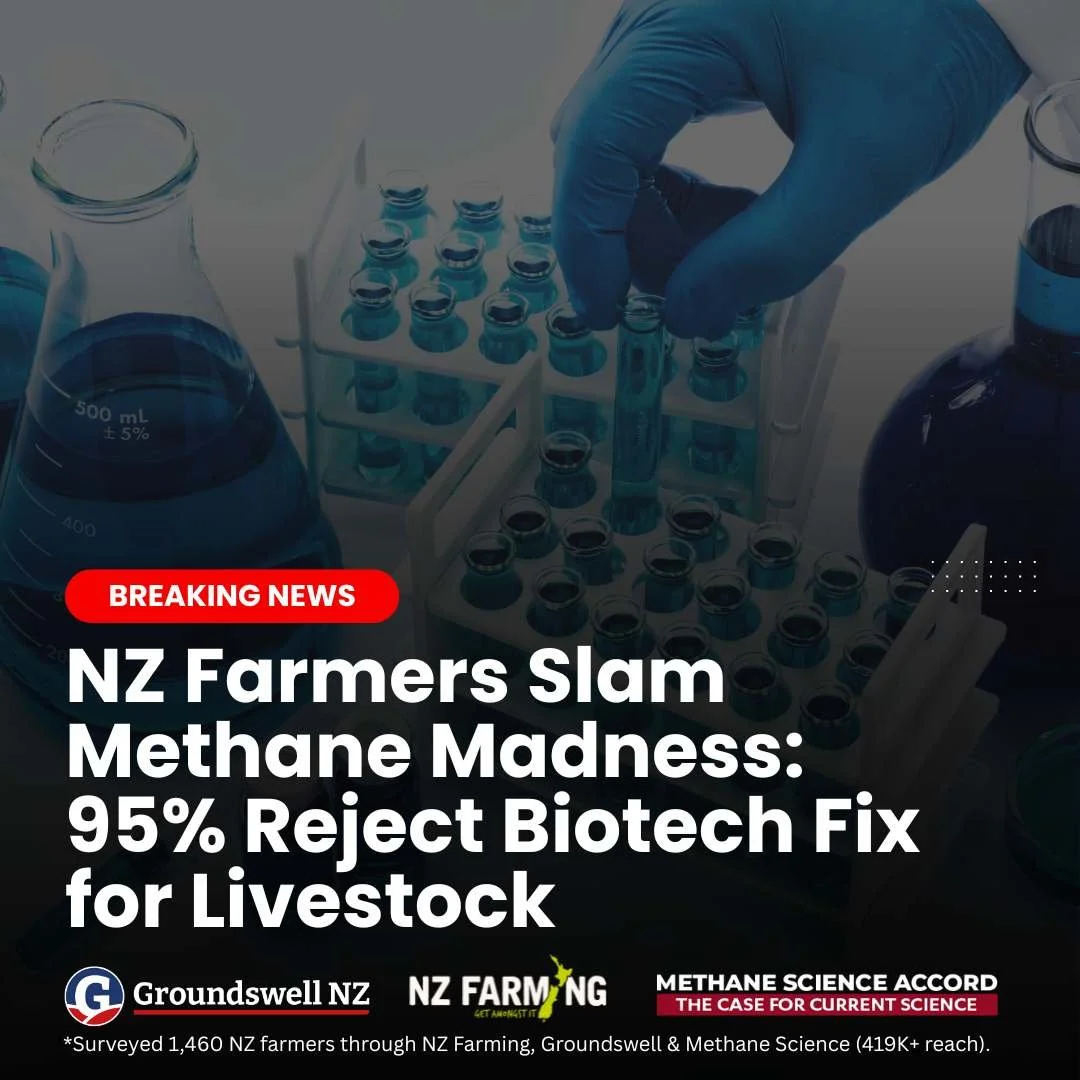BioTech Fixes
An Introduction
Background: For the last decade, government bodies have shifted from an environmental focus of conservation, to heavily investing in biotech fixes for climate change.
Largely unnoticed, this has redirected taxpayer resources from essential services, and is radically transforming land management, animal welfare and food production.
Examples of Biotech
AgResearch projects using: Regulated Gene BioTechnology > Budget 2018-2022
Methane Inhibitors : 6.477million (6.469 million from PGGRC)
GE Forages for GHG : 26.101million (DairyNZ from 3.85million)
GE Pasture microbes/fungi for GHG 18.522 million
Methane Vaccines : 5.51 million (4.135 million from PGGRC)
Insects and Animals for GHG : 12.65 million (Insect active nano-machines & climate-smart dairy cattle +)
Data Obtained Under OIA,
1, 2, 3, 4 Biotech projects obtain government funding through AgriZero or MBIE or similar institution through claiming their biotechnology will result in reduction in Greenhouse Gas Emissions and/or that it will help farmers be more productive with less land, and less animals; in order to meet Climate Goals.
When governments channel investment into patented technologies;
especially those targeted at agriculture, they are not merely backing innovation;
they are reshaping the very fabric of our culture, our food systems, farmer + indigenous rights, nature and biodiversity. The implications of such action are profound and multifaceted.
Government investment into patented biotechnologies,
At first glance, the logic seems sound: invest in innovation, unlock economic growth. Yet, the reality is far more nuanced. These strategies, while they may be well-intentioned, seriously risk blurring the line between true developmental investment and what are, in essence, speculative financial ventures. When taxpayer money is directed into start-ups designed for rapid scaling and quick exits, there’s a real possibility the underlying technologies haven’t proved themselves, either commercially or scientifically.
The consequence? Rather than strengthening long-term national productivity, such moves can inject volatility into the economy, often untethered from any real, lasting value.
Risks. Financial. Ecological
The issue of financial flight. When these start-ups succeed, profits are all too often transferred offshore. The country, instead of nurturing robust, sustainable industries with deep local roots and expertise, becomes little more than a proving ground for innovations whose rewards end up enriching foreign investors. This capital flight doesn’t just mean lost tax revenue; it erodes the multiplier effect that genuine agricultural innovation can deliver, from boosting export volumes to enhancing quality and supporting value added products. What’s left? An innovation ecosystem that looks busy on the surface but is, in fact, worryingly hollow.
Let’s not overlook the deeper risks, either. Betting on biotech agricultural technologies isn’t just a financial gamble; it’s an ecological one. Rapid deployment of patented, experimental methods and technologies can destabilise established farming practices and disrupt delicate ecosystems, risking the introduction of long term pollutants. The resilience of agricultural systems weakens, and, crucially, the country’s reputation for clean green exports is put at risk. Sacrificing ecological integrity for the mirage of quick wins undermines long-term food security and prosperity.
A resilient food system grows
from grassroots knowledge and ecological integrity, not biotech patented shortcuts.
In this context, the need for responsible stewardship becomes glaringly obvious.
Risks. Market, Regulatory
Lack of Market Demand
Government directed technological innovation risks developing technologies that politicians and bureaucrats think is a good idea, and scientists want to develop; but end users (farmers and eaters) neither want or need. Being out of touch with market demand, failing to engage directly with grassroot industries and workers, customers and the general public. The seemingly limitless funds means government innovation technologies do not have to face typical market forces or obtain social licence, which private companies (with no government backing) would self correct or fail.
Regulatory Capture
Under this investment innovation development structure, agencies entrusted with oversight find themselves invested in the very technologies they are meant to evaluate. This dynamic fosters a dangerous environment where regulatory rigour is compromised or outright biased, allowing unproven technologies to enter the market without robust safety evaluations or longtail risk assessment. For farmers, particularly family farmers and Iwi, this means exposure to technologies that may not only fail but also erode traditional practices, seed sovereignty and introduce unpredictable contaminants into the landscape. This haste can lead to irreversible harm to biodiversity, through gene contamination or ecosystem disruption, undermining the longterm resilience of agricultural landscapes essential for future food security
Non-disclosure of Patent
Within the context of food production, ingredients must be disclosed. This allows free market to function. Customers are informed and take personal responsibility for their own choices, particularly where allergies and intolerances are involved. Most customers prefer more disclosure, allowing food choices to support methods of production they want to support. For example: GE Free labelling remains at around 80%+ popularity in surveys worldwide for the past two decades.
Government backed BIOTECH patents exist in a state-corporate grey area, where patent rights prevent full disclosure of ingredients, trials and testing. Meaning farmers are unable to clearly evaluate risks, imposing risks to food production, animal welfare concerns and ecological contamination
The Use of Force
Perhaps most disturbing is, where governments, under the guise of regulation, mandate adoption of these patented technologies (either through direct mandate, fines or incentives). Such coercion, unjustified by transparent science and longterm studies, threatens farmers autonomy, entrenching corporate control. Rural and Indigenous communities, custodians of millennia-old knowledge and biodiversity, find their rights and livelihoods sidelined, if not outright violated.
Government investment in these patented technologies, risks transforming innovation into a tool of exclusion and ecological degradation rather than empowerment and sustainability. The stakes are not simply economic but deeply ethical, demanding vigilance, transparency, democratic accountability in shaping the future of food.
Bureaucratic Overreach in Complex Systems
Government pushes for biotech innovation are undermining long-standing safeguards, precautionary principle, free markets, and traditional farming knowledge. Simple, proven, low-tech solutions and long-term field trials are sidelined in favour of rushed, experimental technologies that disrupt complex natural systems. This risks upsetting natural cycles essential to sustainable farming, threatening not just the land and food quality but also the cultural fabric of farming communities.
Unlike a complicated system like an engine, where each part works predictably, agriculture and nature are complex systems with many interacting parts and unpredictable outcomes. 'Science' pushed by bureaucrats, divorced from practical farming realities, poses a serious risk. Bureaucratic overreach imposes rigid, one-size-fits-all rules on these complex, adaptive systems without understanding their intricacies. As a result, policies ignore local knowledge and ecological realities, leading to unintended damage, reduced resilience, and loss of control over the land.
This mismatch reflects the danger of centralised control in systems that need adaptive, collaborative stewardship grounded in real science and local expertise. Sustainable agriculture requires respecting complexity, not trying to command it.
It’s not about rejecting innovation;
but rather insisting new approaches are grounded in robust science and sustainable practice.
True prosperity in agriculture and, by extension, the wider economy rests on this foundation.
Anything less is simply too risky.








